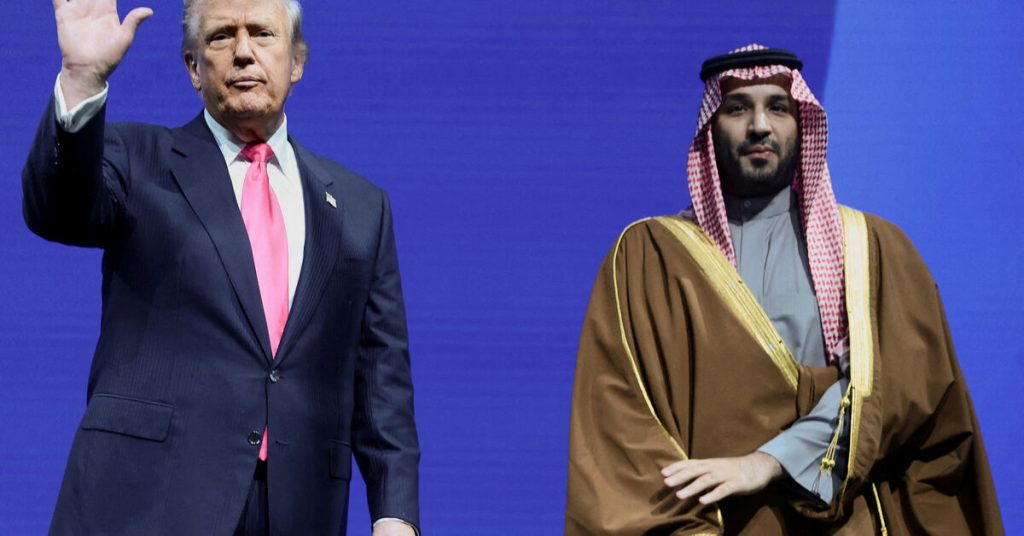The administration of former US President Donald Trump marked a significant departure in American foreign policy, particularly regarding the emphasis traditionally placed on human rights. While previous administrations have often navigated complex relationships with nations possessing questionable human rights records in pursuit of strategic interests, Trump’s approach was noticeably different. This article examines the shift in US policy under Trump, focusing on his handling of sensitive cases like that of Jamal Khashoggi and the broader implications for global human rights advocacy, analyzing the implications of this US foreign policy change.
دفاع ترامب عن ولي العهد السعودي وإعادة تقييم حقوق الإنسان في السياسة الخارجية الأمريكية
(Trump’s Defense of the Saudi Crown Prince and the Re-evaluation of Human Rights in US Foreign Policy)
Recent statements by former President Donald Trump defending Saudi Crown Prince Mohammed bin Salman in connection with the murder of journalist Jamal Khashoggi have ignited widespread criticism, not simply for appearing to side with a controversial figure, but for highlighting a fundamental change in the United States’ approach to human rights on the global stage. Trump’s dismissal of intelligence assessments directly contradicted established findings and signaled a willingness to prioritize relationships over accountability, profoundly impacting international relations.
تحول في الأولويات: من حقوق الإنسان إلى المصالح التجارية
(A Shift in Priorities: From Human Rights to Commercial Interests)
Historically, while often imperfect, US foreign policy has included a rhetorical and sometimes practical commitment to promoting human rights. However, the Trump administration adopted a decidedly more transactional stance. He openly praised autocratic leaders in countries like Hungary, China, and El Salvador, forging closer economic and security ties without significant pressure for political reforms. This focus on “America First” meant that advancing US economic interests often took precedence over concerns about political repression or human rights abuses.
This shift was evident in the Oval Office, where Trump publicly denied any involvement by the Crown Prince in Khashoggi’s death, despite clear evidence to the contrary. Experts like Brett Bruen, a former Obama administration advisor, point out that these actions send a dangerous message, effectively “giving a green light to strongmen to do whatever they want.”
أمثلة على التساهل مع القادة المستبدين
(Examples of leniency with Autocratic Leaders)
The Crown Prince’s visit to Washington was intentionally staged to rehabilitate his image following the Khashoggi affair, replete with red-carpet treatment and meetings with US business leaders. This willingness to overlook alleged abuses wasn’t limited to Saudi Arabia. The administration also appeared remarkably tolerant of the actions of Turkish President Recep Tayyip Erdoğan and Hungarian Prime Minister Viktor Orbán, despite concerns surrounding their domestic policies and crackdowns on dissent.
At the same time though, the administration selectively criticized governments perceived as ideologically opposed, such as Brazil and South Africa, raising questions about the consistency and impartiality of its approach to human rights.
إعادة هيكلة آليات تعزيز حقوق الإنسان في وزارة الخارجية الأمريكية
(Restructuring the Mechanisms for Promoting Human Rights in the US State Department)
The change wasn’t merely a matter of rhetoric. Under the Trump administration, the State Department underwent a significant overhaul of its human rights apparatus. The annual human rights report, a cornerstone of US efforts to monitor and address abuses around the world, was scaled back. Furthermore, the Bureau of Democracy, Human Rights, and Labor was reoriented to emphasize “Western values,” an ambiguous term critics argue was used to justify selective moral judgments.
The emphasis also shifted away from certain areas of concern, like gender-based violence and the persecution of LGBTQ+ individuals, framed by administration officials as respecting the “sovereign affairs” of other countries. Meanwhile, they were surprisingly interventionist in European politics, condemning what they saw as suppression of right-wing nationalist leaders in countries like Romania, Germany, and France. The administration also openly pressured the Brazilian government over its handling of former President Jair Bolsonaro’s prosecution.
الدفاع عن سياسات ترامب: تحقيق المصالح الأمريكية
(Defending Trump’s Policies: Achieving American Interests)
Defenders of the former president’s approach argue that these relationships have been beneficial to US interests, pointing to instances where his personal diplomacy allegedly helped resolve conflicts. Representative Brian Mast, a Republican ally of Trump, highlighted the claim that the administration helped “end conflicts”, suggesting positive humanitarian consequences.
However, this argument fails to address the long-term damage done to the credibility of US human rights advocacy. The administration’s selective criticisms and unwavering support for authoritarian regimes undermined its moral standing and potentially emboldened human rights abusers worldwide.
تداعيات هذا التحول على الساحة الدولية
(The Implications of This Shift on the International Stage)
Trump’s willingness to shield figures like Mohammed bin Salman, demonstrated vividly during the Crown Prince’s White House visit, serves as a stark illustration of his broader approach. He repeatedly stated that it was an “honor” to be friends with the Crown Prince, refusing to acknowledge the evidence linking him to Khashoggi’s murder.
Senator Bernie Sanders offered a scathing assessment, stating that “Trump is putting America on the side of the dictators and oligarchs.” The message resonated globally, leading to concerns that other leaders with problematic human rights records would feel emboldened to act with impunity.
The impact is ongoing. The question remains whether US foreign policy will revert to its previous emphasis on human rights or continue down the path of prioritizing transactional relationships above all else. The future of global human rights advocacy may well depend on the answer.
The shift under Trump has undoubtedly left a lasting legacy on US foreign policy, forcing a crucial re-evaluation of the nation’s role as a champion of democratic values. Further discussion and analysis are needed to understand the full extent of the consequences and to chart a more principled course forward.
